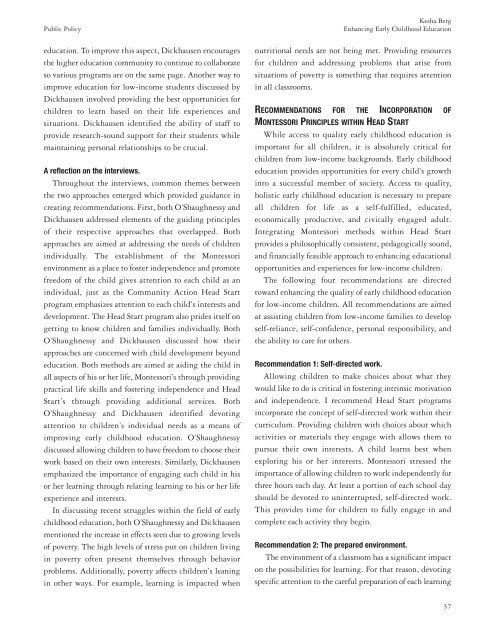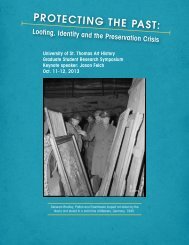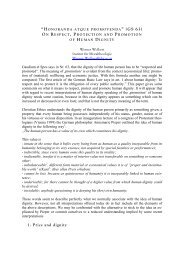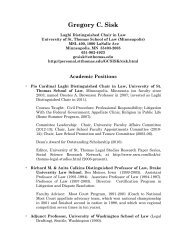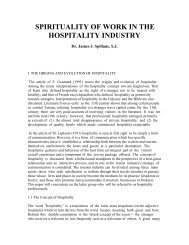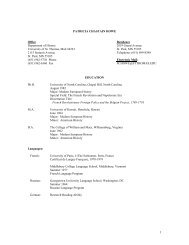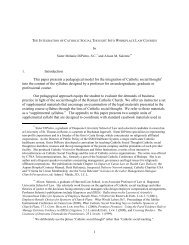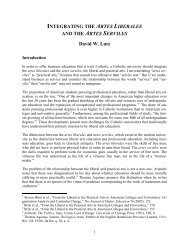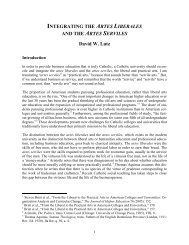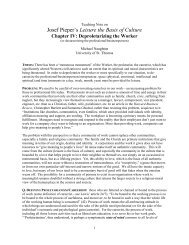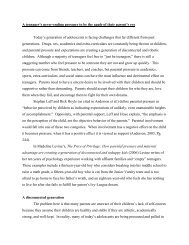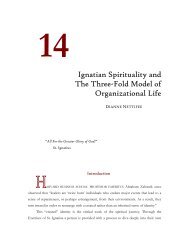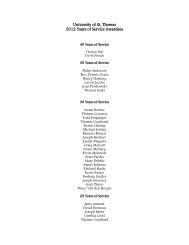dr. ronald e. mcnair acknowledgements - University of St. Thomas
dr. ronald e. mcnair acknowledgements - University of St. Thomas
dr. ronald e. mcnair acknowledgements - University of St. Thomas
Create successful ePaper yourself
Turn your PDF publications into a flip-book with our unique Google optimized e-Paper software.
Kesha Berg<br />
Public Policy Enhancing Early Childhood Education<br />
education. To improve this aspect, Dickhausen encourages<br />
the higher education community to continue to collaborate<br />
so various programs are on the same page. Another way to<br />
improve education for low-income students discussed by<br />
Dickhausen involved providing the best opportunities for<br />
chil<strong>dr</strong>en to learn based on their life experiences and<br />
situations. Dickhausen identified the ability <strong>of</strong> staff to<br />
provide research-sound support for their students while<br />
maintaining personal relationships to be crucial.<br />
A reflection on the interviews.<br />
Throughout the interviews, common themes between<br />
the two approaches emerged which provided guidance in<br />
creating recommendations. First, both O’Shaughnessy and<br />
Dickhausen ad<strong>dr</strong>essed elements <strong>of</strong> the guiding principles<br />
<strong>of</strong> their respective approaches that overlapped. Both<br />
approaches are aimed at ad<strong>dr</strong>essing the needs <strong>of</strong> chil<strong>dr</strong>en<br />
individually. The establishment <strong>of</strong> the Montessori<br />
environment as a place to foster independence and promote<br />
freedom <strong>of</strong> the child gives attention to each child as an<br />
individual, just as the Community Action Head <strong>St</strong>art<br />
program emphasizes attention to each child’s interests and<br />
development. The Head <strong>St</strong>art program also prides itself on<br />
getting to know chil<strong>dr</strong>en and families individually. Both<br />
O’Shaughnessy and Dickhausen discussed how their<br />
approaches are concerned with child development beyond<br />
education. Both methods are aimed at aiding the child in<br />
all aspects <strong>of</strong> his or her life, Montessori’s through providing<br />
practical life skills and fostering independence and Head<br />
<strong>St</strong>art’s through providing additional services. Both<br />
O’Shaughnessy and Dickhausen identified devoting<br />
attention to chil<strong>dr</strong>en’s individual needs as a means <strong>of</strong><br />
improving early childhood education. O’Shaughnessy<br />
discussed allowing chil<strong>dr</strong>en to have freedom to choose their<br />
work based on their own interests. Similarly, Dickhausen<br />
emphasized the importance <strong>of</strong> engaging each child in his<br />
or her learning through relating learning to his or her life<br />
experience and interests.<br />
In discussing recent struggles within the field <strong>of</strong> early<br />
childhood education, both O’Shaughnessy and Dickhausen<br />
mentioned the increase in effects seen due to growing levels<br />
<strong>of</strong> poverty. The high levels <strong>of</strong> stress put on chil<strong>dr</strong>en living<br />
in poverty <strong>of</strong>ten present themselves through behavior<br />
problems. Additionally, poverty affects chil<strong>dr</strong>en’s leaning<br />
in other ways. For example, learning is impacted when<br />
nutritional needs are not being met. Providing resources<br />
for chil<strong>dr</strong>en and ad<strong>dr</strong>essing problems that arise from<br />
situations <strong>of</strong> poverty is something that requires attention<br />
in all classrooms.<br />
RECOMMENDATIONS FOR THE INCORPORATION OF<br />
MONTESSORI PRINCIPLES WITHIN HEAD START<br />
While access to quality early childhood education is<br />
important for all chil<strong>dr</strong>en, it is absolutely critical for<br />
chil<strong>dr</strong>en from low-income backgrounds. Early childhood<br />
education provides opportunities for every child’s growth<br />
into a successful member <strong>of</strong> society. Access to quality,<br />
holistic early childhood education is necessary to prepare<br />
all chil<strong>dr</strong>en for life as a self-fulfilled, educated,<br />
economically productive, and civically engaged adult.<br />
Integrating Montessori methods within Head <strong>St</strong>art<br />
provides a philosophically consistent, pedagogically sound,<br />
and financially feasible approach to enhancing educational<br />
opportunities and experiences for low-income chil<strong>dr</strong>en.<br />
The following four recommendations are directed<br />
toward enhancing the quality <strong>of</strong> early childhood education<br />
for low-income chil<strong>dr</strong>en. All recommendations are aimed<br />
at assisting chil<strong>dr</strong>en from low-income families to develop<br />
self-reliance, self-confidence, personal responsibility, and<br />
the ability to care for others.<br />
Recommendation 1: Self-directed work.<br />
Allowing chil<strong>dr</strong>en to make choices about what they<br />
would like to do is critical in fostering intrinsic motivation<br />
and independence. I recommend Head <strong>St</strong>art programs<br />
incorporate the concept <strong>of</strong> self-directed work within their<br />
curriculum. Providing chil<strong>dr</strong>en with choices about which<br />
activities or materials they engage with allows them to<br />
pursue their own interests. A child learns best when<br />
exploring his or her interests. Montessori stressed the<br />
importance <strong>of</strong> allowing chil<strong>dr</strong>en to work independently for<br />
three hours each day. At least a portion <strong>of</strong> each school day<br />
should be devoted to uninterrupted, self-directed work.<br />
This provides time for chil<strong>dr</strong>en to fully engage in and<br />
complete each activity they begin.<br />
Recommendation 2: The prepared environment.<br />
The environment <strong>of</strong> a classroom has a significant impact<br />
on the possibilities for learning. For that reason, devoting<br />
specific attention to the careful preparation <strong>of</strong> each learning<br />
37


